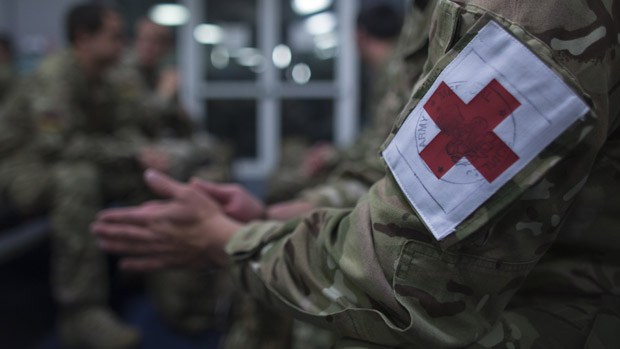Ebola: British army medic tests positive for the disease
Female military healthcare worker contracted Ebola while working in Sierra Leone, MoD confirms

A free daily email with the biggest news stories of the day – and the best features from TheWeek.com
You are now subscribed
Your newsletter sign-up was successful
A British woman has become the first member of the army to contract Ebola while stationed in West Africa, the Ministry of Defence has confirmed.
The army medic, who was working in Sierra Leone, is expected to be flown back to the UK to receive specialist treatment at the Royal Free Hospital in London, Sky News reports.
"Despite there being stringent procedures and controls in place to safeguard UK service personnel, there is always a level of risk in deployments on operations of this type," said the MoD.
The Week
Escape your echo chamber. Get the facts behind the news, plus analysis from multiple perspectives.

Sign up for The Week's Free Newsletters
From our morning news briefing to a weekly Good News Newsletter, get the best of The Week delivered directly to your inbox.
From our morning news briefing to a weekly Good News Newsletter, get the best of The Week delivered directly to your inbox.
The woman's next of kin have been notified, but her name has not been made public. A second military healthcare worker was also tested for the disease after displaying symptoms, but is believed to have been given the all-clear.
An investigation has now been launched into how she contracted the virus at the British-run Ebola clinic in Kerry Town, near Sierra Leone's capital, Freetown.
"Any individuals identified as having had close contact [with this person] will be assessed and a clinical decision made regarding bringing them to the UK," said Public Health England.
"The UK has robust, well-developed and well-tested systems for managing Ebola and the overall risk to the public in the UK continues to be very low."
A free daily email with the biggest news stories of the day – and the best features from TheWeek.com
Up to 700 British military personnel are currently stationed in Sierra Leone, working alongside more than 1,000 NHS volunteers to combat the Ebola crisis.
The woman is the third Briton to test positive for the disease. Nurses William Pooley and Pauline Cafferkey were flown back to the UK for specialist treatment and have both made full recoveries.
Almost 10,000 people are known to have died from the disease and nearly 24,000 have been infected, the majority of them in Sierra Leone, Liberia and Guinea.
"This case is unfortunately a sad reminder that there is an ongoing crisis here with Ebola," said Kate Dooley, from the Africa Governance Initiative.
-
 Why are election experts taking Trump’s midterm threats seriously?
Why are election experts taking Trump’s midterm threats seriously?IN THE SPOTLIGHT As the president muses about polling place deployments and a centralized electoral system aimed at one-party control, lawmakers are taking this administration at its word
-
 ‘Restaurateurs have become millionaires’
‘Restaurateurs have become millionaires’Instant Opinion Opinion, comment and editorials of the day
-
 Earth is rapidly approaching a ‘hothouse’ trajectory of warming
Earth is rapidly approaching a ‘hothouse’ trajectory of warmingThe explainer It may become impossible to fix
-
 Epstein files topple law CEO, roil UK government
Epstein files topple law CEO, roil UK governmentSpeed Read Peter Mandelson, Britain’s former ambassador to the US, is caught up in the scandal
-
 Iran and US prepare to meet after skirmishes
Iran and US prepare to meet after skirmishesSpeed Read The incident comes amid heightened tensions in the Middle East
-
 Israel retrieves final hostage’s body from Gaza
Israel retrieves final hostage’s body from GazaSpeed Read The 24-year-old police officer was killed during the initial Hamas attack
-
 China’s Xi targets top general in growing purge
China’s Xi targets top general in growing purgeSpeed Read Zhang Youxia is being investigated over ‘grave violations’ of the law
-
 Panama and Canada are negotiating over a crucial copper mine
Panama and Canada are negotiating over a crucial copper mineIn the Spotlight Panama is set to make a final decision on the mine this summer
-
 Why Greenland’s natural resources are nearly impossible to mine
Why Greenland’s natural resources are nearly impossible to mineThe Explainer The country’s natural landscape makes the task extremely difficult
-
 Iran cuts internet as protests escalate
Iran cuts internet as protests escalateSpeed Reada Government buildings across the country have been set on fire
-
 US nabs ‘shadow’ tanker claimed by Russia
US nabs ‘shadow’ tanker claimed by RussiaSpeed Read The ship was one of two vessels seized by the US military